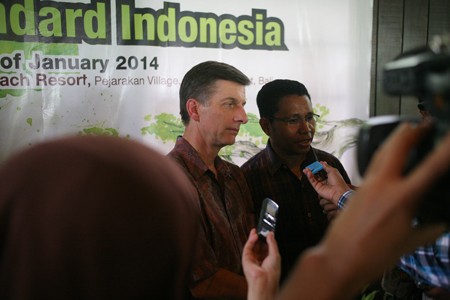
For Immediate Release
BALI – The United States government and the Indonesian Ministry of Forestry today launched a new rainforest standard for carbon credits in Bali Barat National Park. Based on long-standing collaboration between the University of Indonesia and Columbia University in the U.S., this landmark initiative will help to reduce the loss of Indonesia’s tropical forests and biodiversity.
The Rainforest Standard - providing alternative financing for the protection of Bali Barat National Park - is the world’s first carbon credit standard to fully integrate requirements for carbon accounting, socio-cultural/socio-economic impacts, and biodiversity. This is the first time the Rainforest Standard has been launched in Asia, putting Indonesia at the forefront of carbon emissions reduction efforts.
“Through this initiative, Indonesia is at the leading edge of preserving biodiversity and setting conservation standards,” said USAID Mission Director Andrew Sisson. “We strongly believe that scientific collaboration between our two countries can help to address the challenge of global climate change.”
This partnership illustrates the United States’ commitment to invest in conservation and sustainable resource management programs through unique collaboration with universities, national parks, local communities, and the private sector. The project provides a new way of generating income for the management of protected areas on a large scale and it fully engages the private sector in its implementation.
In addition to Mr. Zulkifli Hasan, Indonesia’s Minister of Forestry, the event was attended Kim Young-Sun, Ambassador of the Republic of Korea, representatives of the Embassy of Sweden, and several high level provincial and local officials from Bali.
This project is just one component of the United States’ programs in Indonesia on the environment, higher education, and science and technology that demonstrate the breadth of U.S. engagement under the U.S.-Indonesia Comprehensive Partnership. This project is being jointly implemented by the Research Center for Climate Change at the University of Indonesia, the Center for Environment, Economy, and Society at Columbia University, and the Sustainable Management Group.







Comment
Make a general inquiry or suggest an improvement.